Abstract
The article investigates the professional and family career expectations among young women entering adulthood (student youth). The questionnaire developed for this study determines the desire of young women to build a balanced life, where both professional development and building a family have equal implementation chances. Given the general trend towards balance, specific groups were identified. One group gave priority to building a professional career, another one – to family. The third group was highly uncertain. The types of motivational structure were associated with the type of career prospects. The young women focused on communication with other people were inclined to prioritize family career, the main inducers of which were the desire to have a close relationship with a partner, sense of security, desire to have and raise children (parenthood). The young women strongly focused on self-realization, tend to build a professional career first, which allows them to realize personal interests and ensure the best disclosure of potential. The group of young women whose motivational aspirations are related to self-analysis and self-knowledge is of interest. They seemed to be closed to interpersonal relations, which makes family building irrelevant for them. The desire for a close interpersonal relationship turned out to be incompatible with the motivational focus on themselves. The study shows that the motivational structure becomes the basis for building professional and family careers when entering adulthood.
Keywords: Motivational orientation, career planning, family, professional
Introduction
The period of adulthood entering is the link between adulting and adulthood itself. The end of childhood is traditionally associated when the age of 18 years is reached (lawful age). However, the modern world raises high demands on a person in terms of the level of social and professional development, so it is difficult to talk about the onset of adulthood immediately after the end of childhood. After adolescence ends, a person continues to solve development problems that prepare him or herself for adulthood. The most important are, as per J. Levinson, the ones connected with career building, when it becomes necessary to 'link the dreams with reality', build close relationship with the partner that will eventually become a bedrock of a family life (as cited in Craig & Baucum, 2005). The solution of these development tasks becomes urgent for students, who not only master the necessary professional competencies, but also continue to work on personal self-determination (Konshina et al., 2018; Pryazhnikov, 1996). The task of self-determination in modern society becomes quite difficult, as the variability and flexibility of career paths significantly increase (Cherednichenko, 2014). In addition, the very nature of career promotion is changing, which requires further research, primarily in relation to the period of adulthood entering and early stages of career development (Patton & Lokan, 2001). Modern women have a wide range of opportunities with regard to life outlook. They are no longer restricted to family roles, as they were in a recent past (Martsinkovskaya, 2019). The women are given such vast opportunities for self-realization in professional and public life, the fulfillment of marital and parental roles steps aside, which creates the risk of demographic problems (Karabanova et al., 2018).
Problem Statement
With regard to the above, an urgent task was to study the correlation of professional plans and family context in the life outlook of young women. In addition, the success of solving developmental problems ensures psychological well-being, and, therefore, it is relevant to study the conditions that provide it. We assumed that one of the most important conditions for career building is a motivational structure of life, in which, considering its hierarchical structure, the priorities are formed that set the motivational orientation. We suppose that motivational orientation of a person determines the design of his or her particular type of career.
Research Questions
In connection with the problem stated above and the hypotheses expressed, we set the following research tasks:
- to identify the plans for professional and family career among young women entering adulthood; to determine the priority directions of career development among modern youth;
- to identify the correlation of the planned career development with motivational orientation; to answer the question 'to what extent the motivational structure determines the choice of a particular career type’.
Purpose of the Study
The study was aimed at the identification of possible correlation between the type of the planned career development and motivational orientation of young women entering adulthood.
Research Methods
In order to reach the aims of research, the questionnaire called 'Professional and Family Career (SPK)' was developed. It consisted of 5 scales - motivational orientation in career building, career plan, locus of control in relation to career, time perspective (there are two subscales for professional and family careers) and the scale of consistency of family and professional careers. The subjects were asked to agree or disagree with 71 given statements, based on a 5-point scale (from 5 - 'absolutely agree', to 1 – 'completely disagree'). The scores received in response to statements belonging to the same scale were summed up, becoming an indicator of characteristic's expression (Zakharova et al., 2020). The method of 'Motivational Inductions' by J. Nuttin was a means to analyze motivational structure of a person (Nutten, 2004; Tolstykh, 2005). The method is a list of unfinished statements that allows determining the motivational orientation and the orientation of main motivational inductors in the time perspective.
Findings
During research, where 158 young women aged 18 to 20 years studying psychology and pre-school pedagogy at Russian universities (Department of Psychology of Lomonosov Moscow State University, Penza State University) were participants, the following results were obtained.
The studied sample showed that young women strive to achieve the balance between family and professional career. They gave 10.5 points out of 15 on average in favor of such life scenario. Less common is the priority given to one of the career development lines. The participants gave the average 8.39 priority points to the professional career, and 9.99 point to the family career. We see here that young women entering adulthood highly appreciate the task of family building, hope, however, to successfully combine family and professional career. This demonstrates that modern women are aimed at the full self-realization.
As it is shown on the diagram (Figure 01), while building a professional career young women first of all tend to satisfy their personal interest. They choose jobs to their liking, which gives them hope that professional activity would help unlock their potential to the full. The motive of self-realization is the second most prominent during professional career building. Being in demand, high status of profession and possibility to gain material benefit motivate the participants much less (t-criterion 64.77; 61.77; 53.607 respectively at ҏ = 0.00). In building a family career, young women tend more to form close relationship which quite correspond to their relative development task (Havighurst, Erikson). The desire to have a close person, with whom one can share the most intimate things, get psychological support and protection is the main motive to create family among modern young women. Unfortunately, the birth and upbringing of children encourage them to create family to the least extent (t-criterion- 33.626 at ҏ=0.00). The possibility of self-realization in family life seems not that obvious to them than self-realization in professional career (t–criterion - 51.524 at ҏ=0.00).
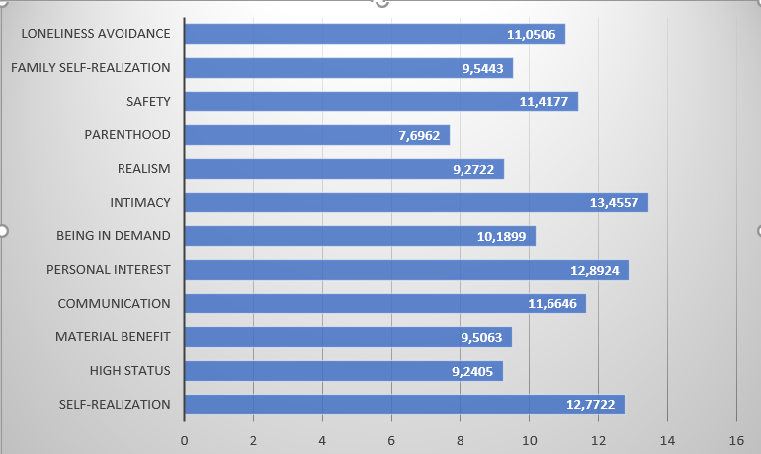
Considering career lines planning in a time perspective, we used a cluster analysis to divide the participants into 3 groups.
The first group of young women () are highly focused on building a professional career. They clearly prefer it to family.
The professional career outlook seems clearer and closer to them. This group included 22.2% of participants. The operant motive is professional self-realization and satisfaction of personal needs (see Fig. 2). The high status of job and material benefit are not of high importance for them (Kruskal-Wallis - 0.003 at ҏ=0.05). Like other participants of the study, they have high expression extent of the close relations building (intimacy), but the outlook of having children does not correspond to their relevant needs. They see self-realization in family as less possible.
The second group consisted of young women who preferred family career – 41.1 % of participants (). The prospect of family creation is significantly closer to them (Kruskal-Wallis criterion 0.000 at ҏ=0.05). Young women in this group differ from others because the family building equals children's birth and upbringing to them (Kruskal-Wallis criterion 0.000 at ҏ=0.05). Professional activity is rather a means of satisfying material needs, which are more emphasized in this group. Professional career is seen as a place where young women can meet their needs for communication, aimed at society satisfaction (demand). Involvement in interpersonal relationship provides the opportunity for young women in this group to avoid loneliness. This tendency is expressed significantly higher (Kruskal-Wallis 0.000 at ҏ=0.05).
The third group of participants, which made up 36.7% of the sample, is characterized by a high degree of uncertainty of the time perspective (). Despite the fact that they are currently involved in building a professional career (mastering the necessary competencies), their professional future is extremely uncertain. Future family life is also not related to time frames, which significantly distinguishes this group from the previous two (Kruskal-Wallis criterion 0.000 at ҏ=0.05). Almost equal number of points given in priority of professional career, family career and striving for balance completes the picture of uncertainty. This is why a low level of career plans maturity is assumed. The solution of the age-related development problem (establishing close relationship) serves to ensure the need for security (Kruskal-Wallis criterion 0.000 at ҏ=0.05). A close person seems most likely to provide care and let oneself feel protected.
We realized that career development strategy considers a general need-motivational sphere and analyzed its content. The results obtained by Nutten's (2004) Motivational Induction' method were cluster-analyzed, which allowed detecting 4 specific groups of respondents (Figure 02).
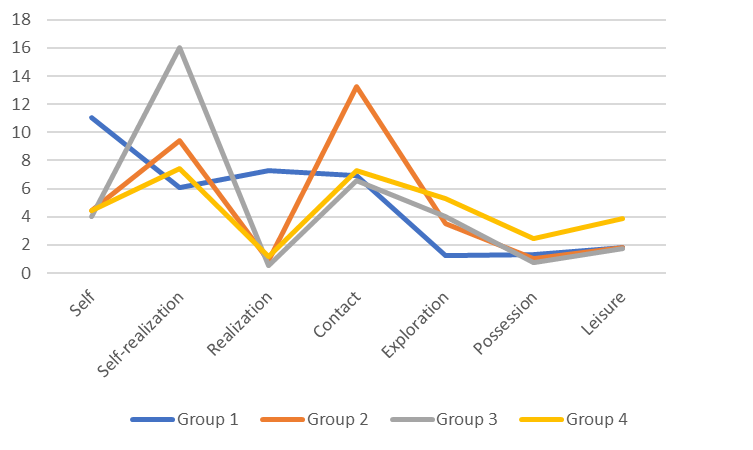
The first group of participants () focus on their personal qualities, which they strive to either improve or preserve (afraid of losing them). Their share was 13.3% of the study sample. Here are some of the answers: I strive... ''; I really want... ''; I terribly want... ', I'd like to be able to... '; I am ready...I have a strong desire....
The motives associated with their own personal qualities (Fig. 3) are expressed in this group of young women much stronger than other motives (Kruskal-Wallis 0.00 at ҏ=0.05). It seems that the participants of this group keep solving the development problem of adolescence and are immersed in the search for ego-identity.
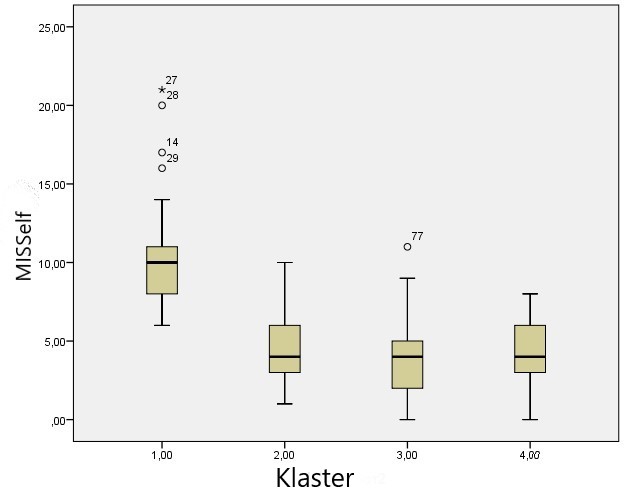
The participants of the first group are characterized by high creative aspirations: Success for me is... ''; Someday… ''; I have a certain intention to.... ''; I want to.... However, there is no striving for self-improvement or knowledge on their way to achieve the above. It is expressed to a lesser extent with this group than with the other ones. This is also typical of adolescence, when dreams are not yet supported by real life plans (Kon, 1979; Molchanov, 2020).
The second group of participants is characterized by a strong motivation of communication (). In the motivational profile of a person, it is a dominant motivation. Their share was 26.6% of the study sample. Here are some of the statements: The worst punishment for me is... ''; My great hope is... '; I am afraid... ' best reward would be... ''.
The desire for communication, focus on interpersonal relationship significantly distinguishes the participants of this group from the rest (Kruskal-Wallis 0.00 at ҏ=0.05). Among the motivating forces (Fig.4), the desire to build stronger friendship and ties with the parent family and build their own partnerships prevails.
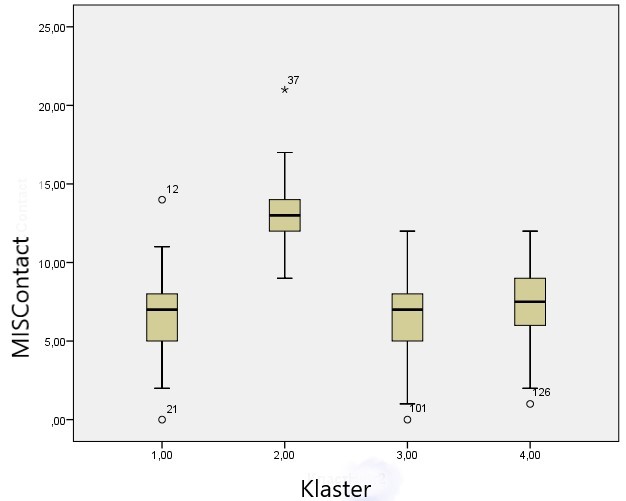
A distinctive feature of young women from the third group () is a pronounced desire for self-development and self-realization. Their share was 28.5% of the sample: I definitely want to... ''; I have a definite intention... ''; I have a strong desire for... ''.
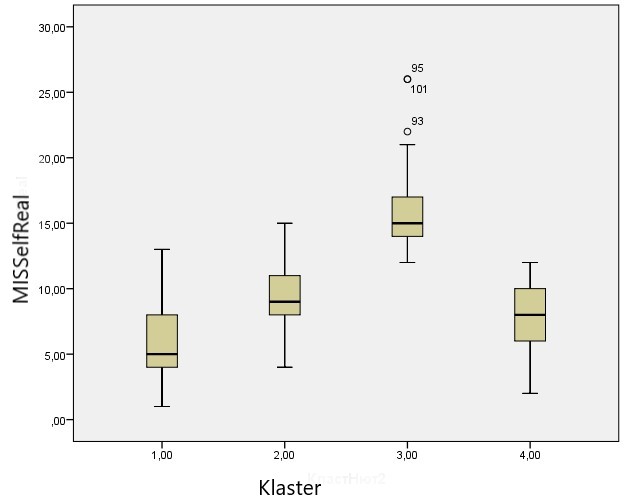
Unlike other participants of the study, the young women of this group (Fig. 5) are focused on improving their abilities, which corresponds to the current social situation of their development (Kruskal-Wallis 0.00 at ҏ=0.05). The desire for improvement is the core of the motivational structure of their personality.
Young women of the fourth group are less likely to strive for self-development and communication and are much more prone to the desire for possession, exciting life, and leisure (). Their share was 31.6% of the sample. The wish to get the maximum of pleasure, impressions, material goods from life becomes a distinctive feature of this group (Kruskal-Wallis 0.00 at ҏ=0.05) (Figures 6,7).
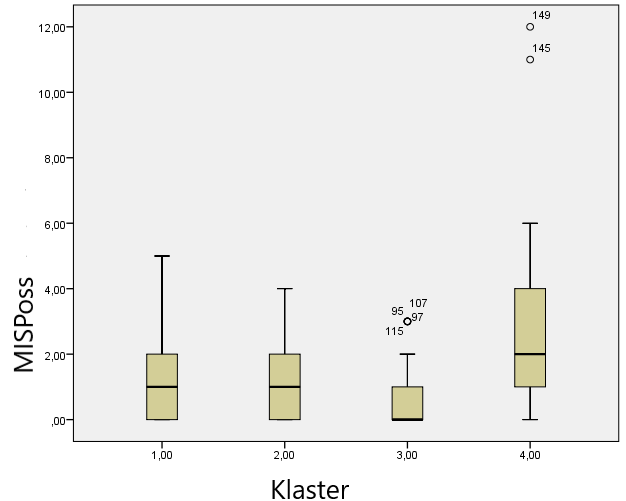
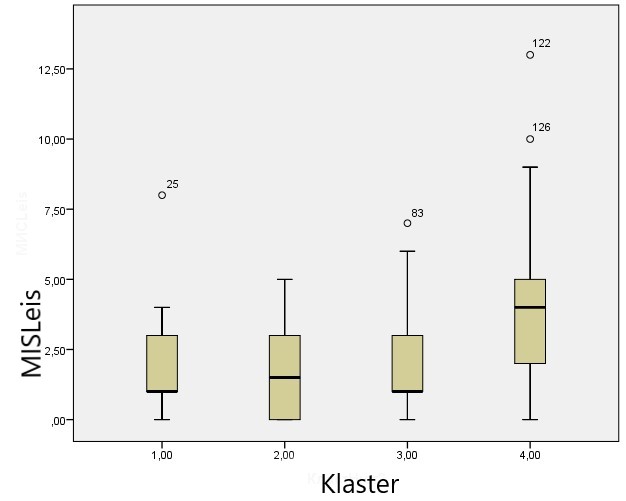
Here are some common statements: Someday... ''; I will be glad... ''; I really want... ''; Someday... ''. The main endeavors of young women are expressed in the following statements: I will make all possible... ''; I would really love... ''; I would be most pleased... ''; As soon as possible, I wish to...
With the help of correlation analysis (Spearman's rank correlation test), we could record a statistically significant correlation between the content of the individual motivational structure and the motives for building a professional and family career among the participants. The analysis of the correlation between the individual orientation towards self-realization showed that young women see this opportunity primarily giving the priority to professional career (r=0.152 at ҏ = 0.05). But the balanced promotion in both professional and family spheres is also allowed (r=0.180 at ҏ = 0.02). The bond between the focus on self-realization and the motives for building a close relationship and parenthood was revealed (r=0.199 at ҏ=0.01; r=0.174 at ҏ=0.024). It shows that the participants of the study see the possibility of self-improvement not only in professional, but also in the family sphere. However, creative aspirations are negatively associated with parenthood (r = -0.292 at ҏ=0.00). The priority of building a family career is typical of young women who have a focus on communication (r=0.201 at ҏ=0.009). The desire to prioritize the professional career building is negatively associated with a focus on communication (r= -0,226 at ҏ= 0.003). The focus on the sphere of interpersonal relations is significantly associated with the motives of creating a family in order to embody parenthood and avoid loneliness (r=0, 264 at ҏ = 0.001; r = 0.193 at ҏ=0.012). We see that the family context allows such young women to meet the needs that make up the core of the motivational structure of their personality.
We see the opposite picture with the participants who turned out to be focused on self-analysis and self-knowledge. Immersion into the sphere of their individual traits is negatively associated with the desire to build a family (negative correlation with the priority of family career r= -0.205 at ҏ=0.008) and contradicts the motives of family self-realization, parenthood, search for security in relationship with the loved ones (r=-0.156 at ҏ= 0.044; r= -0.334 at ҏ= 0.00; r= -0.174 at ҏ=0.024). Our assumption that this group is not ready to solve the problems of early adulthood development is confirmed, since the task of building their own self-concept is relevant for them.
The correlation between the prevailing orientation of a person and the type of planned career movement was significant - Pearson's Chi-squared test 14.541 at ҏ= 0.024.
Conclusion
Summing up the results of the study, we were able to determine both general and specific features of career planning by young women entering adulthood. It was confirmed that while being students, the life outlook is still quite uncertain; the process of professional and personal self-determination continues (Gut & Kabardov, 2019). Many respondents showed a high degree of uncertainty both in the priorities of career promotion and timeframes of achieving its certain stages. At the same time, some of participants had a clearer life outlook, which allowed us to talk about the types of career planning (with regard to family and professional plans and the nature of time perspective). The results of the study indicate that family life is more important for the majority of participants, but its building is postponed for an indefinite future. Young women do not see the opportunity of self-realization in family life. This may be due to the sample peculiarity (student youth), whose closest goals are connected with professional development. A modern young woman is rather strongly motivated to build a professional career, and the predominant motivation is self-realization in activities that reflect the sphere of personal interests, which is consistent with the data obtained in other studies (Mogilevkin & Novgorodov, 2011);
The results of the study showed that the motives of career promotion are consistent with the content of the motivational structure of the young women personality. We confirmed that the type of the planned career promotion reflects more general psychological education. The motivational orientation of a person creates the background for choosing a particular career strategy. The research allows us to draw the following conclusions:
- Modern young women (students) are focused on building a balanced strategy for career planning, in which the construction of a professional career is combined with family.
- There are twice as many young women who consider building a family life as a priority in their life outlook than those who prioritize professional career.
- The main motivating forces in building a family is the desire for close relationship in which young women can feel supported and protected. The wish to have and raise children is expressed weaker than other motives for creating a family. The prospect of parenthood is not attractive for young women entering adulthood.
- The choice of a family career as a priority, the desire for parenthood is typical of young women with a motivational orientation towards interpersonal communication. The importance of social interaction determines the need to build a space for close interaction.
- Young women see the main area for self-realization and self-development in the professional activity only. The study participants who have a motivational focus on self-development and self-improvement consider building professional career a priority.
The uncertainty of plans for career promotion and unwillingness to create a family system is revealed among young women who focus on their own personal traits. The motivational focus on self-knowledge, which ensures the construction of ego-identity, does not contribute to the effective solution of the problem of early adulthood development, which is the career planning.
Acknowledgments
The study was conducted with the financial support of the Russian Foundation for Basic Research (project No. 20-013-00819/21 'Personal factors of harmonization of family and professional career in the construction of life plans in the time perspective of young people in the period of entering adulthood').
References
Cherednichenko, G. (2014). Educational and professional trajectories of Russian youth (based on sociological research). TSP and M.
Craig, G., & Baucum, D. (2005). Developmental psychology. Piter.
Gut, Y., & Kabardov, M. (2019). Features of the time perspective of personality at the stage of professional self-determination. Pedagogy and psychology of education, 5(3), 85-97.
Karabanova, O., & Zakharova, E. (2020). Personal factors of coordination of professional and family career in youth. European Proceedings of Social and Behavioral Sciences, 94, 353-360.
Karabanova, O., Zakharova, E., Burmenskaya, G., Almazova, O., Dolgikh, A., Molchanov, S., & Sadovnikova, T. (2018). Features of valuable sphere of girls with different attitudes the parental attitude of the mother at the stage of entering adulthood. Bulletin of the Moscow State Regional University. Series: Psychological Sciences, 4, 24-37.
Kon, I. (1979). Psychology of youth: the problem of personality formation. Prosvescheniye.
Konshina, T., Pryazhnikov, N., & Sadovnikova T. (2018). The personal professional perspective in modern Russian adolescence: the value and sense aspects. Bulletin of Moscow University. Series 14. Psychology, 3, 37-59.
Martsinkovskaya, T. (2019). The Dynamics of Identity in the Information and Transitive Space. European Proceedings of Social and Behavioral Sciences, Future Academy, 114, 356-364.
Mogilevkin, E., & Novgorodov, A. (2011). Research of the leading motives of career self-determination among students of the university. Theory of new opportunities. Bulletin of Vladivostok State University of Economics and Service, 1, 61-78.
Molchanov, S. (2020). Psychology of adolescence and youth: a textbook for universities. Yurayt Publishing House.
Nutten, J. (2004). Motivation, action, and the prospect of the future. Smysl.
Patton, W., & Lokan, J. (2001). Perspectives on Donald Super's construct of Career Maturity. International Journal for Educational and Vocational Guidance, 1(1-2), 31–48.
Pryazhnikov, N. (1996). Professional and personal self-determination. Institute of Practical Psychology; Voronezh, NGO MODEK.
Tolstykh, N. (2005). Using the method of motivational induction to study motivation and the time perspective of the future. Psychological diagnostics, 77-95.
Zakharova, E., Karabanova, O., & Starostina, Y. (2020). Representation of family and professional careers in the life plans of young women during adulting. Pedagogical education in Russia, 6, 203-210.
Copyright information

This work is licensed under a Creative Commons Attribution-NonCommercial-NoDerivatives 4.0 International License.
About this article
Publication Date
06 December 2021
Article Doi
eBook ISBN
978-1-80296-118-8
Publisher
European Publisher
Volume
119
Print ISBN (optional)
-
Edition Number
1st Edition
Pages
1-819
Subjects
Uncertainty, global challenges, digital transformation, cognitive science
Cite this article as:
Zakharova, E. I., Karabanova, O. A., & Starostina, Y. A. (2021). Motivational Structure Of Personality As Basis For Professional And Family Career Building. In E. Bakshutova, V. Dobrova, & Y. Lopukhova (Eds.), Humanity in the Era of Uncertainty, vol 119. European Proceedings of Social and Behavioural Sciences (pp. 302-312). European Publisher. https://doi.org/10.15405/epsbs.2021.12.02.38

